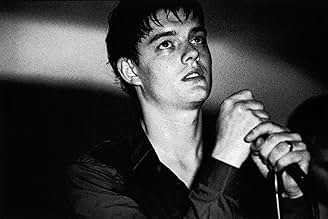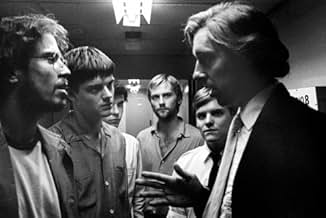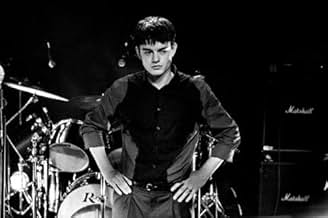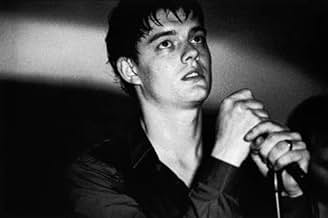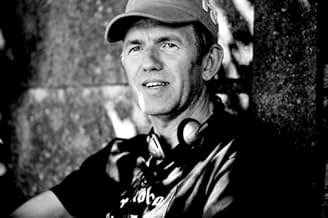Control
- 2007
- Tous publics
- 2h 2m
IMDb RATING
7.6/10
71K
YOUR RATING
A profile of Ian Curtis, the enigmatic singer of Joy Division whose personal, professional, and romantic troubles led him to die by suicide at the age of 23.A profile of Ian Curtis, the enigmatic singer of Joy Division whose personal, professional, and romantic troubles led him to die by suicide at the age of 23.A profile of Ian Curtis, the enigmatic singer of Joy Division whose personal, professional, and romantic troubles led him to die by suicide at the age of 23.
- Director
- Writers
- Stars
- Won 1 BAFTA Award
- 31 wins & 36 nominations total
Martha Myers Lowe
- Ian's Sister
- (as Martha Myers-Lowe)
Mary Jo Randle
- Debbie's Mother
- (as Mary-Jo Randle)
- Director
- Writers
- All cast & crew
- Production, box office & more at IMDbPro
Featured reviews
For me personally writing a comment for Control has proved to be a very difficult thing, my love of the band Joy Division has stayed with me from the very first moment I listened to the Unknown Pleasures album back in 1979. I remember Ian Curtis's death like it was yesterday, and no matter how many years roll by, I still feel an immense sadness when listening to the bands poetic beauty. I was mightily relieved after reading Deborah Curtis's book Touching From A Distance, for I found it refreshingly honest, and certainly it helped people get in a bit deeper to just what a troubled young man Ian Curtis was. So here we are in 2008 and the film adaptation of that book has arrived with truly brilliant results.
I have found it hard to write a comment for it because I have to cast aside my biased love of the band, but hopefully I've managed to view it objectively with both my head and my heart. Control is a film about Ian Curtis, the lead singer of the band Joy Division, people expecting an in-depth film about the band will be a little disappointed because this is the story of their lead singer, a troubled young man who just couldn't face it anymore. Filmed in black & white to perfectly capture the essence of the man the film is about, director Anton Corbijn has stayed loyal to the source material and crafted a haunting piece of work that lingers long after the final credits roll.
We follow Ian Curtis from his humble music leanings in the early 70s, here he meets Deborah who is soon to become his wife, a married man at the age of 18. We watch him join a group of Manchester lads at a Sex Pistols concert, it is here that the roots of Joy Division are formed. Then it's on to the formation of Factory records and the influential Svengali Tony Wilson. As the band start to make waves Ian Curtis becomes ill with epilepsy, and it's here that Corbijn crucially shows that the doctors involved really didn't have a clue how to treat him properly, trial and error with cocktails of drugs indeed.
Deborah and Ian become parents to Natalie, but Ian is away on the road for many days and nights, and it's here that he yearns for love from another quarter, and it's here that his infidelity will hang heavy on his already sunken shoulders. The band are set to make it big, their manager announces that they are about to tour America for the first time, this only adds another fraught string to Ian's already fractured bow, the pressure of fame a lethal bedfellow with Messrs epilepsy and infidelity, and then? I can't praise the work on this film enough, Sam Riley {relatively unknown outside of his hometown of Leeds} is simply brilliant as Curtis, dragging the viewer in completely on this desperately sad journey. Samantha Morton as Deborah is immense, she nails the emotional see-saw role with professional aplomb, and I would also like to raise a glass for the performance of the criminally undervalued Toby Kebbell (Dead Man's Shoes, Wilderness) his turn as Joy Division's manager Rob Gretton is down pat. Director Corbijn clearly had love for the project, and thankfully he was sensible enough to not over do the sentimental aspect of the troubled star. What Corbijn has done is perfectly frame the bleaker side of the story with old terraced houses and monstrous looking high rise's, they scream out as dank and dreary statements in black & white, yet they are overlooked by rolling hills to serve as a reminder when Curtis was at his happiest during the courtship with Deborah. Some scenes are unforgettable, such is the power of the emotion on offer, look out for the stunning appearance of heart tugging song Love Will Tear Us Apart, a crucial and poignant scene, and of course the film's tragic outcome hits like a sledgehammer. To which I thank Corbijn for giving us a very tasteful conclusion to this sad sad story.
So there it is, was I biased? I like to think I wasn't because I honestly feel that one doesn't have to be a fan of the band to get much from this movie. The film has won many awards, and I'm happy to report that Control has brought renewed interest in the beautiful/haunting work of one of England's greatest ever bands. Remastered CDs, reissued books, and even T-shirts are selling well in the shops as I type.
Control is a very sobering experience for fans and newcomers alike. 10/10
RIP Ian Curtis, you are very much missed.
I have found it hard to write a comment for it because I have to cast aside my biased love of the band, but hopefully I've managed to view it objectively with both my head and my heart. Control is a film about Ian Curtis, the lead singer of the band Joy Division, people expecting an in-depth film about the band will be a little disappointed because this is the story of their lead singer, a troubled young man who just couldn't face it anymore. Filmed in black & white to perfectly capture the essence of the man the film is about, director Anton Corbijn has stayed loyal to the source material and crafted a haunting piece of work that lingers long after the final credits roll.
We follow Ian Curtis from his humble music leanings in the early 70s, here he meets Deborah who is soon to become his wife, a married man at the age of 18. We watch him join a group of Manchester lads at a Sex Pistols concert, it is here that the roots of Joy Division are formed. Then it's on to the formation of Factory records and the influential Svengali Tony Wilson. As the band start to make waves Ian Curtis becomes ill with epilepsy, and it's here that Corbijn crucially shows that the doctors involved really didn't have a clue how to treat him properly, trial and error with cocktails of drugs indeed.
Deborah and Ian become parents to Natalie, but Ian is away on the road for many days and nights, and it's here that he yearns for love from another quarter, and it's here that his infidelity will hang heavy on his already sunken shoulders. The band are set to make it big, their manager announces that they are about to tour America for the first time, this only adds another fraught string to Ian's already fractured bow, the pressure of fame a lethal bedfellow with Messrs epilepsy and infidelity, and then? I can't praise the work on this film enough, Sam Riley {relatively unknown outside of his hometown of Leeds} is simply brilliant as Curtis, dragging the viewer in completely on this desperately sad journey. Samantha Morton as Deborah is immense, she nails the emotional see-saw role with professional aplomb, and I would also like to raise a glass for the performance of the criminally undervalued Toby Kebbell (Dead Man's Shoes, Wilderness) his turn as Joy Division's manager Rob Gretton is down pat. Director Corbijn clearly had love for the project, and thankfully he was sensible enough to not over do the sentimental aspect of the troubled star. What Corbijn has done is perfectly frame the bleaker side of the story with old terraced houses and monstrous looking high rise's, they scream out as dank and dreary statements in black & white, yet they are overlooked by rolling hills to serve as a reminder when Curtis was at his happiest during the courtship with Deborah. Some scenes are unforgettable, such is the power of the emotion on offer, look out for the stunning appearance of heart tugging song Love Will Tear Us Apart, a crucial and poignant scene, and of course the film's tragic outcome hits like a sledgehammer. To which I thank Corbijn for giving us a very tasteful conclusion to this sad sad story.
So there it is, was I biased? I like to think I wasn't because I honestly feel that one doesn't have to be a fan of the band to get much from this movie. The film has won many awards, and I'm happy to report that Control has brought renewed interest in the beautiful/haunting work of one of England's greatest ever bands. Remastered CDs, reissued books, and even T-shirts are selling well in the shops as I type.
Control is a very sobering experience for fans and newcomers alike. 10/10
RIP Ian Curtis, you are very much missed.
It's 1973 Macclesfield, England. Ian Curtis (Sam Riley) is a quiet enigmatic student. He marries Debbie Woodruff (Samantha Morton) in 1975. He works as an employment agent. On June 4, 1976, they attend a small Sex Pistols concert. Also in attendance are Bernard Sumner, Peter Hook, and Terry Mason. Ian joins them as their lead singer. They call themselves Warsaw and eventually Joy Division.
There is a sense of disconnection from this movie and a mystery about Ian Curtis. Sam Riley's performance, the long takes, and the black and white photography all make Ian an enigma. It's a slow burn but compelling. The tone is sad and respectful. It's very fitting of the band and its music.
There is a sense of disconnection from this movie and a mystery about Ian Curtis. Sam Riley's performance, the long takes, and the black and white photography all make Ian an enigma. It's a slow burn but compelling. The tone is sad and respectful. It's very fitting of the band and its music.
Making the leap from photographer to music video director to film director, Anton Corbijn's feature length debut 'Control' is quite simply stunning. Shot entirely in black and white it tell the story of Ian Curtis the lead singer with Manchester band Joy Division but its also much more than that it also tells of one mans journey into the heart of darkness (Apocalypse Now is mentioned in the film) a journey of fear, paranoia, illness and depression. Curtis has been played in films before but only as bit parts (24 hour party people etc) here he is portrayed breathtakingly by Sam Riley who played Mark E Smith in 24 hour party people and when he first appears on the screen I have to admit I wasn't convinced but as Ian the person grows so too does Riley into the role and at times he has him so down to a tee its hard to imagine its not the real Curtis up there. The rest of the band are pretty good as well but are only really second fiddle to Riley but you have to give them credit for learning all the songs and playing them live rather than mime. Samantha Morton is great as the put upon wife Deborah and Craig Parkinson is convincing enough as Tony Wilson but apart from Riley's stand out performance its Toby Kebbell as manager Rob Gretton who has some of the best lines and has come so far since his role in 'Dead Man's Shoes'. The cinematography is a visual feast for the eyes, being shot in black and white adds to the mood and gives a haunting feel that echo's the music and lyrics of the band, it also means (and I guess its Corbijn's photography background) that so many of the shots in the movie could be still images they are framed so well. Although never really explained in terms of answers, Curtis's illness from the seizures to the depression and the hopeless sense of falling apart reminded me of Catherine Deneuve in Polanski's 'Repulsion' another black and white film that deals with madness. I guess that treating mental illnesses was still in its infancy in the seventies, yes we'd stopped electro-shocking people but medications were still being developed and trialled. It seems it was very easy for Curtis to reach a certain point what with juggling home, life on the road, his condition and the pressure of increasing fame but when it came to helping him out he really was on his own and did feel a sense of 'isolation'. But with a story that has a widely known end point its more about the journey and here Corbjin punctures the narrative with some truly witty moments while leading up the incredibly moving and inevitable finale. Handled brilliantly by all involved this is another example of a great British film that deserves all the accolades it is receiving and if this performance is anything to go by expect Riley to be very big indeed.
The first thing that strikes you about 'Control' is its silence, and the chilly beauty of its black and white images. As a still photographer first-time director Anton Corbijn photographed Joy Division in black and white during their short existence. He knows how to get the remorselessly grim feel of the north of England in the late Seventies. (The boys came from the outskirts of Manchester. Joy Division formed in 1976.) This film (there's a documentary just coming out on the band too) is loosely based on a memoir of her marriage by Deborah Curtis, lead singer Ian Curtis' young wife, who had a baby girl by him and then tragically found him after he'd hanged himself in 1980, two months short of his twenty-fourth birthday, just as the band was to tour America for the first time.
'Control's' strength is a certain recessiveness. In the English style, it's offhand and avoids huge dramatic crescendos. That's refreshing. And besides the images and the restraint, the film is worth seeing for the concert sequences. The cast actually plays the Joy Division music live, and Sam Riley, who plays Ian Curtis, not only closely resembles him, but is a riveting and intense, almost at times scary, performer. When he says the public doesn't know how much of himself he puts into his performances, we know what he means.
The film is excellent at showing Ian's dilemmas. The band is a sudden success. He has an attack in their car as the band returns from a gig. Doctors tell him he has a form of epilepsy. He's given a fistful of pills to take every day and told to have early nights and stay off the booze. How faithfully he takes the pills is unclear but he suffers from their side effects in various ways, while late nights and booze are essentials of his existence. It doesn't seem that the English doctors knew very well how to treat him, and he was so busy performing he didn't take the time to go to specialists and have more extensive tests.
Ian had gotten married to Deborah (Samantha Morton) early--too early. On the road he meets a Belgian part-time journalist, Annik Honoré (Alexandra Maria Lara), and they fall uneasily in love. He's not strong enough to decide between the two women. Fear that his disease will only get worse hounds him, and the fits go on. Riley is fascinating to watch as he undergoes an increasingly visible meltdown. Other cast members are cyphers, though Joe Anderson, who has the role of Max in Taymor's Across the Universe, is the lead guitarist. Morton has a drab role but Deborah's unfortunate situation is present as a constant counterpart to Ian's story. The two other important characters are the Manchester music guru Tony Wilson (Craig Parkinson) and the band's wise-guy manager Rob Gretton (Toby Kebbell).
The creative inspiration of the band, the nature of their songs, the cast of their lyrics, the reason why Joy Division is a cult band today when it only existed for four years--these are matters the film is unable to elucidate. Watch it for the cool visuals, for the tall, soulful Sam Riley, and for the terrific live performance scenes. Enjoy the understatement, and the silence. Don't expect more.
Harvey Weinstein has chosen both for Control and for the soon-to-open Todd Haynes Bob Dylan film I'm Not There to have a slowly-unrolling distribution system, and hopes to bestow early cult status on both films by having them premiere at that temple of cinephilia, Film Forum, in lower Manhattan, New York City, and wait for the buzz of the cognoscenti to multiply and spread. It may work. But both films are tough sells. But A.E. Scott of the NYTimes has said Control is "enigmatic and moving, much in the manner of Joy Division's best songs." And that's a good send-off.
'Control's' strength is a certain recessiveness. In the English style, it's offhand and avoids huge dramatic crescendos. That's refreshing. And besides the images and the restraint, the film is worth seeing for the concert sequences. The cast actually plays the Joy Division music live, and Sam Riley, who plays Ian Curtis, not only closely resembles him, but is a riveting and intense, almost at times scary, performer. When he says the public doesn't know how much of himself he puts into his performances, we know what he means.
The film is excellent at showing Ian's dilemmas. The band is a sudden success. He has an attack in their car as the band returns from a gig. Doctors tell him he has a form of epilepsy. He's given a fistful of pills to take every day and told to have early nights and stay off the booze. How faithfully he takes the pills is unclear but he suffers from their side effects in various ways, while late nights and booze are essentials of his existence. It doesn't seem that the English doctors knew very well how to treat him, and he was so busy performing he didn't take the time to go to specialists and have more extensive tests.
Ian had gotten married to Deborah (Samantha Morton) early--too early. On the road he meets a Belgian part-time journalist, Annik Honoré (Alexandra Maria Lara), and they fall uneasily in love. He's not strong enough to decide between the two women. Fear that his disease will only get worse hounds him, and the fits go on. Riley is fascinating to watch as he undergoes an increasingly visible meltdown. Other cast members are cyphers, though Joe Anderson, who has the role of Max in Taymor's Across the Universe, is the lead guitarist. Morton has a drab role but Deborah's unfortunate situation is present as a constant counterpart to Ian's story. The two other important characters are the Manchester music guru Tony Wilson (Craig Parkinson) and the band's wise-guy manager Rob Gretton (Toby Kebbell).
The creative inspiration of the band, the nature of their songs, the cast of their lyrics, the reason why Joy Division is a cult band today when it only existed for four years--these are matters the film is unable to elucidate. Watch it for the cool visuals, for the tall, soulful Sam Riley, and for the terrific live performance scenes. Enjoy the understatement, and the silence. Don't expect more.
Harvey Weinstein has chosen both for Control and for the soon-to-open Todd Haynes Bob Dylan film I'm Not There to have a slowly-unrolling distribution system, and hopes to bestow early cult status on both films by having them premiere at that temple of cinephilia, Film Forum, in lower Manhattan, New York City, and wait for the buzz of the cognoscenti to multiply and spread. It may work. But both films are tough sells. But A.E. Scott of the NYTimes has said Control is "enigmatic and moving, much in the manner of Joy Division's best songs." And that's a good send-off.
Control, a biopic about a band from Manchester, is getting serious attention from around the world. Starting with an award in Cannes. That's maybe more than you might expect. Joy Division, a respected band of the 70s, are hardly a name on everyone's lips. And films made by ex music video directors about yet another load of rockers rarely raise eyebrows. So why is this different? Joy Division, for non-initiates, were a post-punk Manchester band of throbbing guitars and dark, doom-laden lyrics. Recognition in the music biz (especially by other musicians) was perhaps even greater after the death of lead singer, Ian Curtis. Control covers a period from his schooldays to his end in 1980 (aged 23). It is based on the biography of his widow.
Control uses Curtis' love of poetry, as well as the more familiar songs-that-tell-a-story device, to provide at least scant insight into the music. "I wish I were a Warhol silkscreen, hanging on the wall," he muses. But what is dealt with in much more detail is his growing sense of isolation, coping with epilepsy as the pressures of touring build up, and the distraught domestic relations he is embroiled in with wife Debbie (Samantha Morton) and romantic-interest-from-afar Annik (Alexandra Maria Lara). "It's like it's not happening to me but someone pretending to be me. Someone dressed in my skin," he says.
In a telling scene when he is under hypnosis, the camera revolves around his head as we hear voices speaking to him. "Ian, let me in, love," says his wife, "there's room to talk." Responsibilities as husband and father. A mistress who is also in love with him. A band and fan following who want more than he can give. From warholian, carefree screen-dream of youth, he has arrived at a place where he doesn't want to be. Drugs and their side-effects no longer a schoolboy's recreational laugh. Prescription bottles grip with morbid fascination. And the knowledge that doctors don't have a cure.
The film carries viewers away with blistering intensity. Relative newcomer Sam Riley plays Curtis with alarming energy. With Samantha Morton, it's not what she says but what you see going through her mind. She contains her expressiveness for the camera to pick up (rather than thrusting it on us). We want to cry inside for her character. As a feat of interiorisation, Control puts her as a contender in the shoes of Meryl Streep.
Supporting cast members come through with believability and sincerity, sparkling with well-honed contrasts. Toby Kebbell, fast-talking manager Rob, lifts us out of the depressive mood with wisecracks enough to make legless monkeys jump. "Where's my £20?" asks a hapless stand-in as Rob deals with an emergency. "In my f*ck-off pocket!" he barks back. Craig Parkinson is record producer and late TV presenter Tony Wilson (to whom the opening screening at the Edinburgh International Film Festival was dedicated). He demonstrates fine shades of teeth-gritting tolerance, explaining to the band, seconds before their first live TV show: yes, 'large dog's c*ck' counts as swearing, and would mean the broadcast is pulled. Established Romanian actress, Alexandra Maria Lara, succeeds in making Annik far more than the two-dimensional bit-of-fluff that would have been an easy course. As potential home-breaker, it is tempting to hate her, yet her character is shown with the intellectual appreciation and chemistry that Debbie can no longer offer.
Morton, in the Q&A after the Edinburgh premiere, links the film to Saturday Night and Sunday Morning. It is the kitchen-sink, downtrodden existence that her Debbie inhabits. Cinematography is also reminiscent of this period, with its careful black-and-white observation of working class streets. I watched it a second time, enjoying careful compositions and suggestive mise-en-scene. But director Anton Corbijn is typically modest. "I really wanted you to look at the actors on the screen and only afterwards at the look of the film." While Ian, in Debbie's eyes, might be the licentious and 'angry young man' of social realism drama, the Control scenes from which she is tormentedly absent show another side: the world experienced by her husband (a reference in the film likens his isolation to Brando's character in Apocalypse Now).
"And we would go on as though nothing was wrong. And hide from these days we remained all alone."
Riley takes on manic expressions as if marching away from an impending epileptic fit while singing Transmission. It is such a potent, almost frightening feat, that we have to shake ourselves to remember he only got the part when he was stuck for a job. "Not a lot was going on in my life before this, so I was appreciative for the work and the money," he tells the opening night audience. "I imagine this will have opened doors for you," I had said to him earlier; he smiled like a man who still can't believe his good luck. But the 'luck' is very well deserved. His 'Ian' is physically and mentally complex. When I had managed to stop him on the Red Carpet long enough to congratulate him, Mr Riley explains that he had a friend who was an epileptic. "I witnessed an attack often enough to be able to copy it."
Although the film has a driving energy that takes our breath away, it drifts a little towards the tragic conclusion. We know the ending and it is a case of waiting for it to happen. And although it features plenty of excellent Joy Division tracks, any music biopic will never be good enough or accurate enough for some fans.
Fortunately this is not just for music fans but for serious film fans as well. It careers in a tightly controlled arc, where music biopic meets cinematic excellence. Why should you see it? "Some people visit the past for sentimental reasons," says Corbijn. "Some people visit the past to understand the present better." Control is not in the sentimental exercise category.
Control uses Curtis' love of poetry, as well as the more familiar songs-that-tell-a-story device, to provide at least scant insight into the music. "I wish I were a Warhol silkscreen, hanging on the wall," he muses. But what is dealt with in much more detail is his growing sense of isolation, coping with epilepsy as the pressures of touring build up, and the distraught domestic relations he is embroiled in with wife Debbie (Samantha Morton) and romantic-interest-from-afar Annik (Alexandra Maria Lara). "It's like it's not happening to me but someone pretending to be me. Someone dressed in my skin," he says.
In a telling scene when he is under hypnosis, the camera revolves around his head as we hear voices speaking to him. "Ian, let me in, love," says his wife, "there's room to talk." Responsibilities as husband and father. A mistress who is also in love with him. A band and fan following who want more than he can give. From warholian, carefree screen-dream of youth, he has arrived at a place where he doesn't want to be. Drugs and their side-effects no longer a schoolboy's recreational laugh. Prescription bottles grip with morbid fascination. And the knowledge that doctors don't have a cure.
The film carries viewers away with blistering intensity. Relative newcomer Sam Riley plays Curtis with alarming energy. With Samantha Morton, it's not what she says but what you see going through her mind. She contains her expressiveness for the camera to pick up (rather than thrusting it on us). We want to cry inside for her character. As a feat of interiorisation, Control puts her as a contender in the shoes of Meryl Streep.
Supporting cast members come through with believability and sincerity, sparkling with well-honed contrasts. Toby Kebbell, fast-talking manager Rob, lifts us out of the depressive mood with wisecracks enough to make legless monkeys jump. "Where's my £20?" asks a hapless stand-in as Rob deals with an emergency. "In my f*ck-off pocket!" he barks back. Craig Parkinson is record producer and late TV presenter Tony Wilson (to whom the opening screening at the Edinburgh International Film Festival was dedicated). He demonstrates fine shades of teeth-gritting tolerance, explaining to the band, seconds before their first live TV show: yes, 'large dog's c*ck' counts as swearing, and would mean the broadcast is pulled. Established Romanian actress, Alexandra Maria Lara, succeeds in making Annik far more than the two-dimensional bit-of-fluff that would have been an easy course. As potential home-breaker, it is tempting to hate her, yet her character is shown with the intellectual appreciation and chemistry that Debbie can no longer offer.
Morton, in the Q&A after the Edinburgh premiere, links the film to Saturday Night and Sunday Morning. It is the kitchen-sink, downtrodden existence that her Debbie inhabits. Cinematography is also reminiscent of this period, with its careful black-and-white observation of working class streets. I watched it a second time, enjoying careful compositions and suggestive mise-en-scene. But director Anton Corbijn is typically modest. "I really wanted you to look at the actors on the screen and only afterwards at the look of the film." While Ian, in Debbie's eyes, might be the licentious and 'angry young man' of social realism drama, the Control scenes from which she is tormentedly absent show another side: the world experienced by her husband (a reference in the film likens his isolation to Brando's character in Apocalypse Now).
"And we would go on as though nothing was wrong. And hide from these days we remained all alone."
Riley takes on manic expressions as if marching away from an impending epileptic fit while singing Transmission. It is such a potent, almost frightening feat, that we have to shake ourselves to remember he only got the part when he was stuck for a job. "Not a lot was going on in my life before this, so I was appreciative for the work and the money," he tells the opening night audience. "I imagine this will have opened doors for you," I had said to him earlier; he smiled like a man who still can't believe his good luck. But the 'luck' is very well deserved. His 'Ian' is physically and mentally complex. When I had managed to stop him on the Red Carpet long enough to congratulate him, Mr Riley explains that he had a friend who was an epileptic. "I witnessed an attack often enough to be able to copy it."
Although the film has a driving energy that takes our breath away, it drifts a little towards the tragic conclusion. We know the ending and it is a case of waiting for it to happen. And although it features plenty of excellent Joy Division tracks, any music biopic will never be good enough or accurate enough for some fans.
Fortunately this is not just for music fans but for serious film fans as well. It careers in a tightly controlled arc, where music biopic meets cinematic excellence. Why should you see it? "Some people visit the past for sentimental reasons," says Corbijn. "Some people visit the past to understand the present better." Control is not in the sentimental exercise category.
Did you know
- TriviaThe actors playing Joy Division learned how to play the songs themselves. So the scenes where the band is playing live is not from tape, but actually the actors playing live.
- GoofsJoy Division is shown performing "Transmission" on Tony Wilson's television show in September 1978, but in reality, they performed "Shadowplay". The performance that is represented in this scene actually took place a year later in September 1979 on the BBC2 program "Something Else", when they performed "Transmission" (a performance which was used as the music video for the song) and "She's Lost Control".
- Quotes
Ian Curtis: Existence. Well, what does it matter? I exist on the best terms I can. The past is now part of my future. The present is well out of hand.
- Crazy creditsSPOILER: Epilogue: "Ian Curtis died May 18, 1980. He was 23 years old."
- SoundtracksDrive-In Saturday
(David Bowie)
Published by kind permission of Tintoretto Music/RZO Music Ltd/EMI Music Publishing Ltd/Chrysalis Music Ltd © 1973
Performed by David Bowie
Courtesy of RZO Music
Details
- Release date
- Countries of origin
- Official site
- Language
- Also known as
- Контроль
- Filming locations
- Production companies
- See more company credits at IMDbPro
Box office
- Budget
- €4,500,000 (estimated)
- Gross US & Canada
- $872,252
- Opening weekend US & Canada
- $27,674
- Oct 14, 2007
- Gross worldwide
- $8,159,996
- Runtime
- 2h 2m(122 min)
- Color
- Sound mix
- Aspect ratio
- 2.35 : 1
Contribute to this page
Suggest an edit or add missing content





